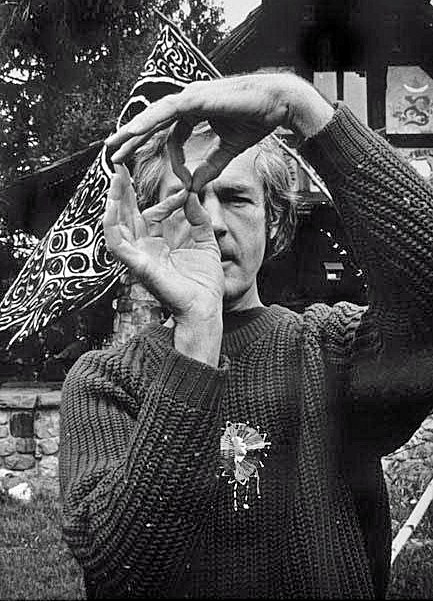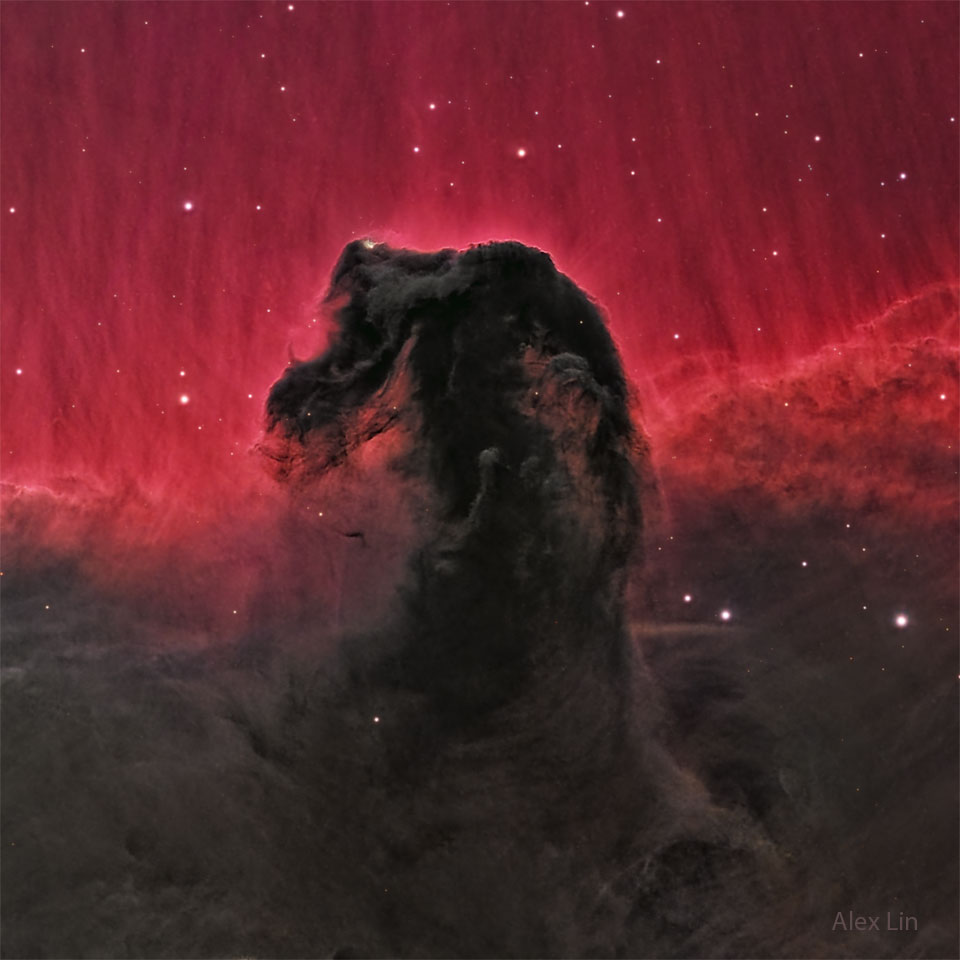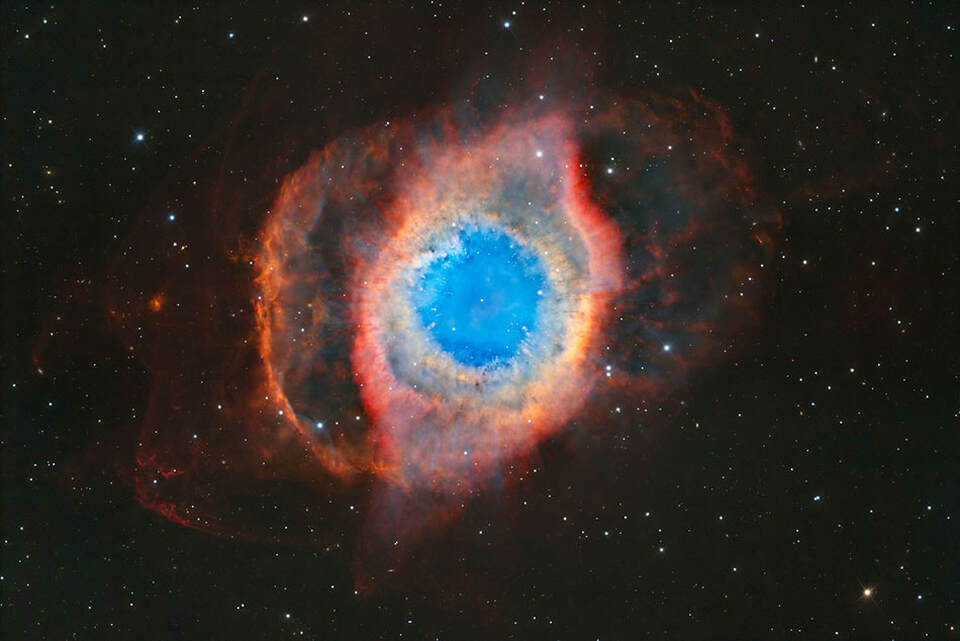Blog

The Horsehead Nebula in Orion, is part of a large, dark, molecular cloud. Also known as Barnard 33, the unusual shape was first discovered on a photographic plate in the late 1800s. The red glow originates from hydrogen gas predominantly behind the nebula, ionized by the nearby bright star Sigma Orionis. The darkness of the Horsehead is caused mostly by thick dust, although the lower part of theHorsehead‘s neck casts a shadow to the left. Streams of gas leaving the nebula are funneled by a strong magnetic field. Bright spots in the Horsehead Nebula‘s base are young stars just in the process of forming. Light takes about 1,500 years to reach us from the Horsehead Nebula. The featured image was taken from the Chilescope Observatory in the mountains of Chile.

more...
John Graham McVie (born 26 November 1945) is a British bass guitarist. He is best known as a member of the rock bands John Mayall & the Bluesbreakers from 1964 to 1967 and Fleetwood Mac since 1967. His surname, combined with that of drummer Mick Fleetwood, was the source for the band’s name.
He joined Fleetwood Mac shortly after its formation by guitarist Peter Green in 1967, replacing temporary bass guitarist Bob Brunning. McVie and Fleetwood are the only two members of the group to appear on every Fleetwood Mac release, and for over fifty years have been the group’s last remaining original (or almost original in McVie’s case) members.
In 1968, McVie married blues pianist and singer Christine Perfect, who became a member of Fleetwood Mac two years later. John and Christine McVie divorced in 1976, but continued working together professionally. During this time the band recorded the album Rumours, a major artistic and commercial success that borrowed its title from the turmoil in McVie’s and other band members’ marriages and relationships.
McVie was inducted into the Rock and Roll Hall of Fame in 1998 as a member of Fleetwood Mac.
more...Tina Turner (born Anna Mae Bullock; November 26, 1939 – May 24, 2023) was a singer, songwriter, and actress. Known as the “Queen of Rock ‘n’ Roll“, she rose to prominence as the lead singer of the husband-wife duo Ike & Tina Turner before launching a successful career as a solo performer.
Turner began her musical career with her future husband Ike Turner‘s band, the Kings of Rhythm, in 1956. Under the name Little Ann, she appeared on her first record, “Boxtop“, in 1958. In 1960, she debuted as Tina Turner with the hit single “A Fool in Love“. The Ike & Tina Turner Revue became “one of the most formidable live acts in history”. The duo released hits such as “It’s Gonna Work Out Fine“, “River Deep – Mountain High“, “Proud Mary“, and “Nutbush City Limits” before disbanding in 1976.
In the 1980s, Turner launched “one of the greatest comebacks in music history”. Her 1984 multi-platinum album Private Dancer contained the hit song “What’s Love Got to Do with It“, which won the Grammy Award for Record of the Year and became her first and only number-one song on the Billboard Hot 100. Her chart success continued with “Better Be Good to Me“, “Private Dancer“, “We Don’t Need Another Hero (Thunderdome)“, “Typical Male“, “The Best“, “I Don’t Wanna Fight“, and “GoldenEye“. She embarked on the Break Every Rule World Tour (1987–1988), which became the top-grossing female tour of the 1980s and set a Guinness World Record for the then-largest paying audience in a concert (180,000). Turner also acted in the films Tommy(1975) and Mad Max Beyond Thunderdome (1985). In 1986, she published her autobiography I, Tina: My Life Story, which was adapted for the 1993 film What’s Love Got to Do with It. In 2009, Turner retired after completing her Tina!: 50th Anniversary Tour. In 2018, she was the subject of Tina, a jukebox musical.
Turner sold more than 100 million records worldwide, becoming one of the best-selling recording artists of all time. She received 12 Grammy Awards, which include eight competitive awards, a Grammy Lifetime Achievement Award and three Grammy Hall of Fame inductions. She was the first black artist and first woman to be on the cover of Rolling Stone. Rolling Stone ranked her among the 100 Greatest Artists of All Timeand the 100 Greatest Singers of All Time. Turner has a star on the Hollywood Walk of Fame and on the St. Louis Walk of Fame. She was inducted into the Rock and Roll Hall of Fame twice: with Ike Turner in 1991 and as a solo artist in 2021. She was also a 2005 recipient of the Kennedy Center Honors and the Women of the Year award.
more...Nesuhi Ertegun (Turkish spelling: Nesuhi Ertegün; November 26, 1917 – July 15, 1989) was a Turkish-American record producer and executive of Atlantic Records and WEA International. As a producer at Atlantic he worked with John Coltrane, Charles Mingus, Ornette Coleman, whom Lester Koenig had previously recorded at Contemporary, the Modern Jazz Quartet and many others. Nesuhi also became involved with the label’s rhythm & blues and rock-and-roll roster, first recruiting songwriters and producers Leiber and Stoller, with whom he had worked in California, and producing several hit records for Ray Charles, Chris Connor, the Drifters, Bobby Darin and Roberta Flack.
more...11-26-1924 to 1-28-2013
Sharp was born in Topeka, Kansas in 1924. His family had settled there because Kansas was, during slavery times, a free state. Sharp’s great-grandmother was a slave and he remembers her telling him stories about lying on the floor while cannonballs blasted through the cabin. The Great Depression soon followed, and Sharp’s parents sent him to live with relatives in Los Angeles while they went to New York to seek their fortune.
Sharp’s father was a concert tenor who won several small roles in Broadway shows but never hit it big. However, their social life was rich; they lived in an apartment building in Harlem with fellow residents Duke Ellington, Walter White, Roy Wilkins and artist Aaron Douglas. It was the peak of the Harlem Renaissance, and poet Langston Hughes was a family friend; Orson Welles had recently staged his famous Black Macbeth at the nearby Lafayette Theater.
Young Bobby stayed in Los Angeles with his pious grandparents and great-grandmother until he was 12, when he begged his parents to let him come to New York. Some family friends drove him cross-country in 1936, and he arrived in the midst of a cocktail soiree in his parents’ apartment on Sugar Hill.
Sharp attended high school in the Bronx and took his first job as an office “go-fer” for the Rockefeller Foundation. When World War II began Sharp joined the Army, was sent first to Ft. Dixon, New Jersey, then joined the 372nd Infantry regiment stationed in New York City, guarding the city and ports. Eventually he was transferred to Breckenridge, Kentucky, where he served until being discharged in 1944. While in the Army, Sharp had begun to sing a bit, “just for kicks,” he says. With the help of the GI Bill he chose to go to music school.
His mother was not happy with his decision. “She wanted me to be a psychiatrist,” Sharp says. “She didn’t want me to get into the music business. She saw what it did to my father.” But Sharp took the advice of a family friend, well- known arranger Sy Oliver, who recommended that Bobby study music theory and composition.
Sharp attended the Greenwich School of Music in 1946, followed by the Manhattan School of Music in 1948. He also took piano. “I just wanted to play chords and get sounds,” he said. Songwriting turned out to be his forte, often combined with his vocals. In 1956 he cut a single in the Wing label, called “Baby Girl of Mine;” it was later covered by Ruth Brown, who sang it as “Sweet Baby of Mine.”
more...Featured in this new NASA/ESA Hubble Space Telescope Picture of the Week is the spiral galaxy NGC 2090, located in the constellation Columba.
This galaxy is notable as a part of the group of galaxies studied in Hubble’s Extragalactic Distance Scale Key Project, which aimed to determine a new state-of-the-art value for the Hubble constant, one of the then-new telescope’s primary science goals. The contribution of NGC 2090 was in calibrating the Tully-Fisher (TF) distance method, by observing Cepheid variable stars in the galaxy. The Cepheid-based measurement from that study in 1998 put NGC 2090 as 37 million light-years away; the newest measurement from 2020, using the TF method, has NGC 2090 slightly farther away, at 40 million light-years.
Before and since that project, NGC 2090 has been well studied as a very prominent nearby example of star formation. It has been described as a flocculent spiral, meaning a spiral galaxy with a patchy, dusty disc and arms that are flaky or not visible at all. This Hubble image shows well why NGC 2090 earned that description, but its spiral arms do appear among the dust as winding lanes of light.
NGC 2090 is a galaxy still full of activity, with clusters of star formation at various stages of evolution spread across the disc. Examining star formation and the movement of matter in galaxies was the motivation for these Hubble observations, taken in October of this year. Likewise Hubble’s partner in space astronomy, the NASA/ESA/CSA James Webb Space Telescope, has also spied on this galaxy to add infrared data to this overall picture of galaxy evolution.
[Image Description: A spiral galaxy with a wide, oval-shaped disc. It has a shining spot at the centre which is surrounded by a whirl of dark threads and patches of dust, all atop a luminous disc. Some brighter lanes curving through the disc indicate the galaxy’s spiral arms. The glow of the disc fades smoothly into a dark background where faint, extended patches of stars can be seen, as well as some foreground stars.]

more...
Val Fuentes (born November 25, 1947) is the original and current drummer for the folk and rock band It’s a Beautiful Day. He has also played with Fat Chance, New Riders of the Purple Sage, Shadowfax, Lina Valentino, Linda Imperial, The Pure Pleasure Band, and The Moments.
Fuentes lives in California and plays shows with David LaFlamme and It’s a Beautiful Day, as well as several other local Sonoma County bands such as The Zins, a rock and funk group.
more...Jamesetta Hawkins (January 25, 1938 – January 20, 2012), known professionally as Etta James, was an American singer and songwriter who performed in various genres, including gospel, blues, jazz, R&B, rock and roll, and soul. Starting her career in 1954, she gained fame with hits such as “The Wallflower“, “At Last“, “Tell Mama“, “Something’s Got a Hold on Me“, and “I’d Rather Go Blind“. She faced a number of personal problems, including heroin addiction, severe physical abuse, and incarceration, before making a musical comeback in the late 1980s with the album Seven Year Itch.
James’s deep and earthy voice bridged the gap between rhythm and blues and rock and roll. She won three Grammy Awards for her albums (2005 – Best Traditional Blues Album for Blues to the Bone; 2004 – Best Contemporary Blues Album for Let’s Roll; and 1995 – Best Jazz Vocal Performance, Female for Mystery Lady: Songs of Billie Holiday) and 17 Blues Music Awards. She was inducted into the Rock and Roll Hall of Fame in 1993, the Grammy Hall of Fame in 1999, and the Blues Hall of Fame in 2001. She also received a Grammy lifetime achievement award in 2003. Rolling Stone magazine ranked James number 22 on its list of the 100 Greatest Singers of All Time; she was also ranked number 62 on Rolling Stone‘s list of the 100 Greatest Artists of All Time.Billboard‘s 2015 list of “The 35 Greatest R&B Artists Of All Time” also included James, whose “gutsy, take-no-prisoner vocals colorfully interpreted everything from blues and R&B/soul to rock n’roll, jazz and gospel.”
The Rock and Roll Hall of Fame called hers “one of the greatest voices of her century” and says she is “forever the matriarch of blues.”
James frequently performed in Nashville’s famed R&B clubs on the so-called “Chitlin’ Circuit” in the 1940s, 1950s, and 1960s.
more...Nathaniel Carlyle Adderley (November 25, 1931 – January 2, 2000 Tampa, FL) was an American jazz trumpeter. He was the younger brother of saxophonist Julian “Cannonball” Adderley, whom he supported and played with for many years.
Adderley’s composition “Work Song” (1960) is a jazz standard, and also became a success on the pop charts after singer Oscar Brown Jr. wrote lyrics for it.
more...Paul Desmond (born Paul Emil Breitenfeld; November 25, 1924 – May 30, 1977)was an American jazz alto saxophonist and composer and proponent of cool jazz. He was a member of the Dave Brubeck Quartet and composed that group’s biggest hit, “Take Five“.
In addition to his work with Brubeck, he led several groups and collaborated with Gerry Mulligan, Chet Baker, Jim Hall, and Ed Bickert. After years of chain smoking and poor health, Desmond succumbed to lung cancer in 1977 after a tour with Brubeck. Desmond died on May 30, 1977, not of his heavy alcohol habit but of lung cancer, the result of his longtime heavy smoking. He was 52.
more...
Missing and Murdered Indigenous Women (MMIW)
https://www.nativehope.org/missing-and-murdered-indigenous-women-mmiw?fbclid=IwY2xjawGwUOtleHRuA2FlbQIxMAABHdE3iXiAAx_JAOlJChbz71sdO3bwuN56FNS-p04xhfeFagsmfemvgoYP_Q_aem_w2p81O7pLoezCktEs6v0_A

The Helix Nebula (also known as NGC 7293 or Caldwell 63) is a planetary nebula(PN) located in the constellation Aquarius. Discovered by Karl Ludwig Harding, most likely before 1824, this object is one of the closest of all the bright planetary nebulae to Earth. The distance, measured by the Gaia mission, is 655±13 light-years. It is similar in appearance to the Cat’s Eye Nebula and the Ring Nebula, whose size, age, and physical characteristics are similar to the Dumbbell Nebula, varying only in its relative proximity and the appearance from the equatorial viewing angle. The Helix Nebula has sometimes been referred to as the “Eye of God” in pop culture, as well as the “Eye of Sauron“. 650 ly distant. Pic Adam Block.

Wild Bill Davis (November 24, 1918 – August 17, 1995 Glasgow, Mo) was the stage name of American jazz pianist, organist, and arranger William Strethen Davis. He is best known for his pioneering jazz electric organ recordings and for his tenure with the Tympany Five, the backing group for Louis Jordan. Prior to the emergence of Jimmy Smith in 1956, Davis (whom Smith had reportedly first seen playing organ in the 1930s) was the pacesetter among organists.
more...More Posts
- Herbie Mann Day
- John Littlejohn Day
- Bennie Green Day
- Alton Purnell Day
- World Music with Tibetan Monks
- Daily Roots with Alton Ellis
- The Cosmos with NGC 4866
- Herb Pomeroy Day
- Sir Neville Marriner Day
- Richard Davis Day
- World Music with Dastan Trio
- Daily Roots with Freddie McGreggor
- POSITIVE VIBRATIONS 5-5-19
- BEAU KOO JACKS 5-5-19
- Voices of Sepharad 4-18-19
- The Cosmos with NGC 1499
- Gene Ammons Day
- Ali Akbar Khan Day
- World Music with Refugees for Refugees
- Daily Roots with the Skatalites
